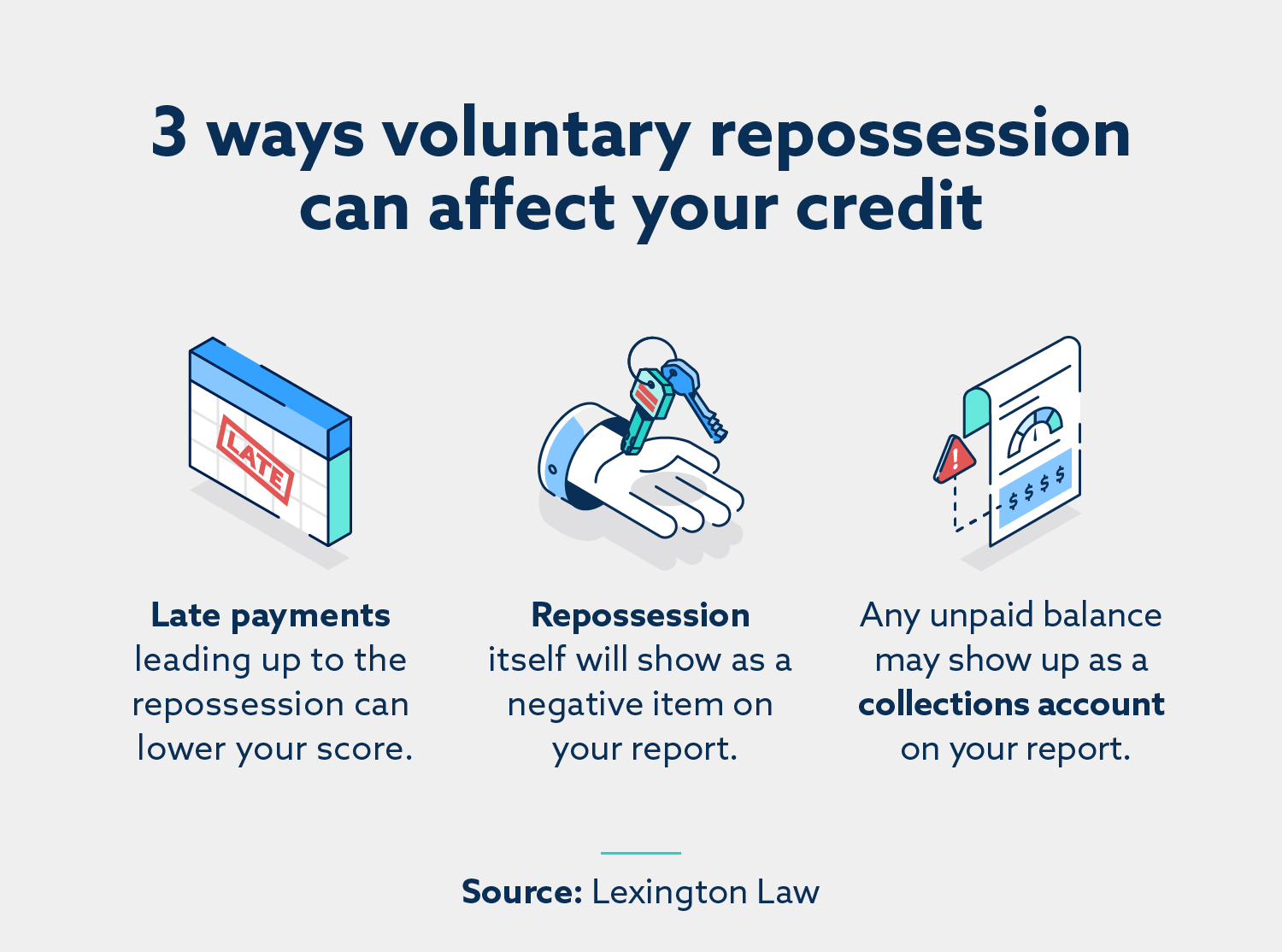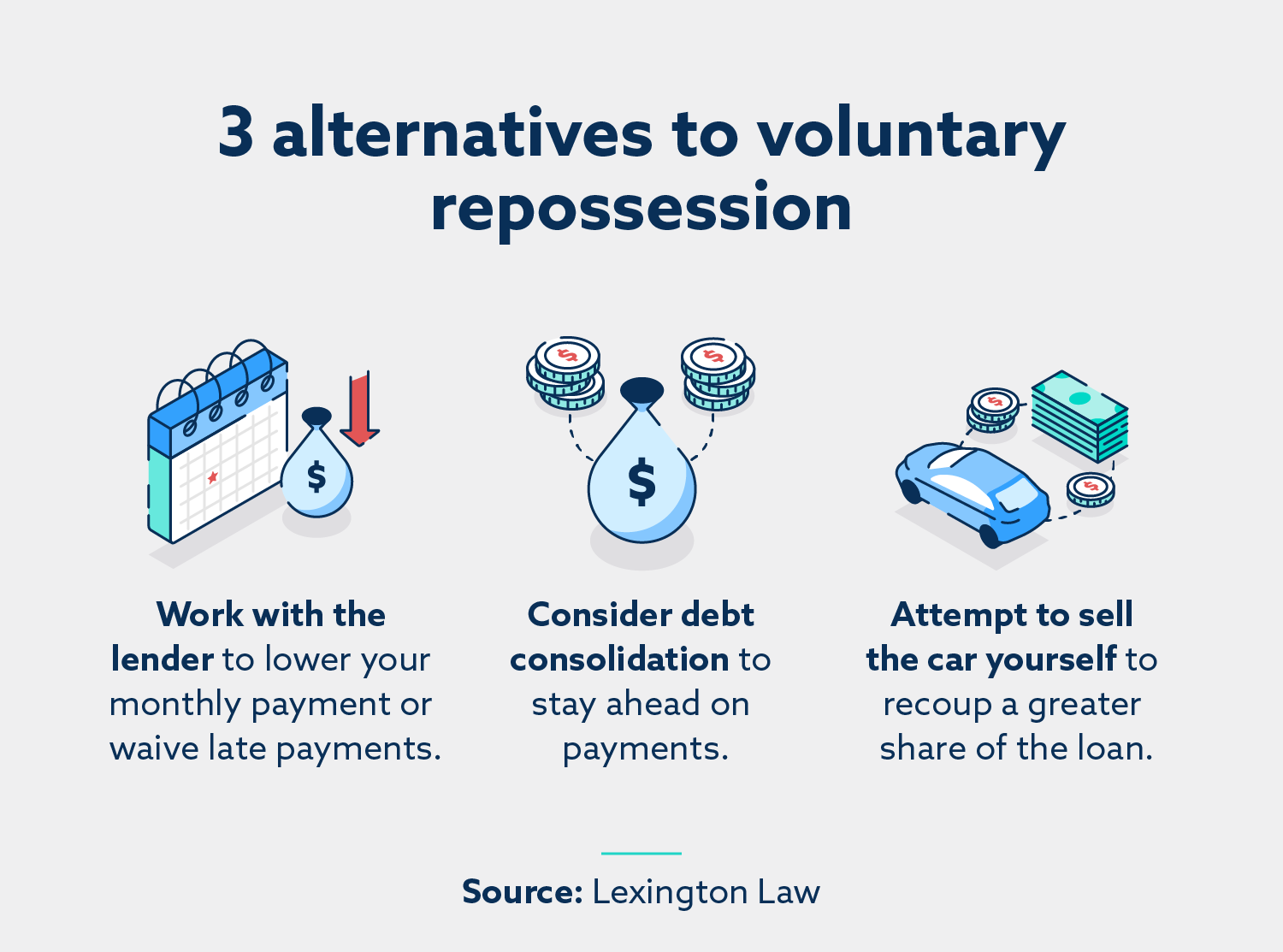
Voluntary repossession will likely cause serious consequences for your credit, including a lower credit score and negative items on your credit report.
The information provided on this website does not, and is not intended to, act as legal, financial or credit advice. See Lexington Law’s editorial disclosure for more information.
Voluntary repossession—also called voluntary surrender—will prevent your car from being seized by the lender if you can no longer pay for the vehicle. However, even though you’ll avoid the emotional turmoil of having your car seized, you’ll likely still face serious consequences for your credit, including a lower credit score and negative items on your credit report.
Often, there are better options than voluntary repossession, so communicate with the lender to see if you can reach a settlement or sales agreement.
When you take out an auto loan, the car belongs to the lender until you’ve finished paying it off. If you stop making payments for a period of time—usually around three months—your loan may be considered in default, and the lender will attempt to repossess the car from you.
While some people suggest that you may gain the favor of your lender by turning over the car voluntarily, it’s unlikely to have any positive effect on your credit.
Read on to learn more about how voluntary repossession works, what voluntary surrender does to your credit and what options you have when you’re facing repossession.
How voluntary repossession works
Voluntary repossession or surrender enables you to turn your car over to a lender rather than having it taken from you.
Repossession can be an emotionally difficult experience, especially since the lender can take your car at any time or location—even without providing a warning.
After the lender receives your car, they will sell it to recoup some of their losses. That said, you may still have a balance after the sale of your vehicle—since cars are depreciating assets, they usually aren’t worth as much as their loan. For instance, if your car sells for $9,000 but your outstanding loan is $16,000, you’ll still owe the lender $7,000, even though the car was already taken away.
Voluntarily giving up your car can spare you the emotional burden of repossession, but it likely won’t have much positive effect on your credit, since a number of negative items will have already accrued on your report by the time repossession is imminent.
How voluntary repossession affects your credit
All repossessions—voluntary or not—have a significant effect on your credit report, though it is possible to recover over time.
Typically, there are three main negative marks that you may accrue on your credit report when you are forced to give up your car: late payments, repossession and collections.

Here’s how each of those negative items affects your credit score:
- Late payments: A payment is late after the due date, but late payments usually aren’t sent to the credit bureaus until they’re 30 days late. A single late payment can lower your score by many points, and you’re likely to have faced several late payments before repossession.
- Repossession: The repossession itself will be reported to the credit bureaus and is likely to show up on your report. If you voluntarily surrender your car, this may be noted on the report, but it will nonetheless hurt your chances of securing another auto loan.
- Collections: After selling your repossessed car, the lender may still be owed money on your loan. If you don’t pay that debt, your account may be sent to collections, which will lead to a negative item on your report and a potential reduction in your credit score.
Even if you previously had good credit, the process of late payments leading to a repossession is likely to leave you with a significantly lower score. For that reason, if you are behind on payments or are facing repossession, it’s important for you to consider your options and work to preserve your credit score and financial health.
Alternatives to voluntary repossession
Before attempting voluntary repossession, you may be able to find another path to retain your vehicle and improve your credit score.

Here are three options to consider before surrendering your car:
1. Work with the lender
Ultimately, a lender wants you to pay back your debt. If you’re experiencing a hardship or have struggled to make your payments for another reason, reach out to your lender proactively to work out a plan.
Depending on your circumstances, lenders may be willing to remove late payments, negotiate a different interest rate or lower your monthly payment.
2. Consider debt consolidation
You may be able to lower your monthly debt payments by consolidating several debts with a lower interest rate or longer payment term. Additionally, it’s sometimes possible to use a balance transfer card to assume your automobile loan with more favorable interest rates.
3. Approach the lender about selling the car privately
While the lender will ultimately sell your car after repossession, they may not get the most favorable price. Working with the lender, you may be able to sell your car privately and recoup a greater percentage of your loan, making it easier to pay off the remaining balance.
Regardless of the approach you take, you are likely to have some negative effects on your credit score. Over time, you can work to build habits that help improve your score, such as making on-time payments, keeping your utilization low and avoiding opening too many accounts.
After voluntary repossession or working with your lender, you’ll want to get a copy of your credit report to see what information has been reported to the credit bureaus. Make sure to scan your report thoroughly—especially keeping an eye out for inaccurate information. Errors on your credit report could be bringing down your score unnecessarily, so consider credit repair services to have incorrect negative items removed.
Note: Articles have only been reviewed by the indicated attorney, not written by them. The information provided on this website does not, and is not intended to, act as legal, financial or credit advice; instead, it is for general informational purposes only. Use of, and access to, this website or any of the links or resources contained within the site do not create an attorney-client or fiduciary relationship between the reader, user, or browser and website owner, authors, reviewers, contributors, contributing firms, or their respective agents or employers.
